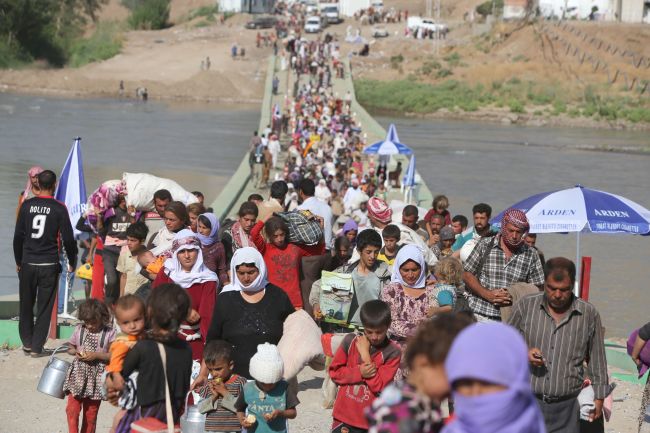U.S. forces assess situation of displaced Iraqi refugees
By Korea HeraldPublished : Aug. 14, 2014 - 21:27
DOHUK, Iraq (AFP) ― U.S. troops assessed the situation Wednesday of thousands of civilian refugees trapped by jihadists on a northern Iraqi mountain, after the United States carried out air strikes against Islamic State militants.
A U.S. military official said the small party of special forces soldiers returned safely to base.
“They had contacts with the refugees. They went back to Arbil,” the official said on condition of anonymity.
A Kurdish spokesman earlier said U.S. military advisers would study means of evacuating the besieged civilians left with little food or water on Mount Sinjar.
The United States, which has a consulate and other facilities in Arbil, the capital of Iraq’s autonomous Kurdish region, deployed around 130 troops on the assessment mission.
A U.S. military official said the small party of special forces soldiers returned safely to base.
“They had contacts with the refugees. They went back to Arbil,” the official said on condition of anonymity.
A Kurdish spokesman earlier said U.S. military advisers would study means of evacuating the besieged civilians left with little food or water on Mount Sinjar.
The United States, which has a consulate and other facilities in Arbil, the capital of Iraq’s autonomous Kurdish region, deployed around 130 troops on the assessment mission.

Iraqi helicopters and Kurdish troops have been trying to come to the aid of the Yazidi religious minority, and Washington and its allies have been studying ways to airlift them off Sinjar or open a humanitarian corridor.
A U.S. drone launched a missile to destroy an Islamic State armed truck to the west of the mountain, the latest in a series of air strikes by drones and fighter jets since Friday.
The U.N. refugee agency has said tens of thousands of civilians, many of them Yazidi members, remain stranded.
Various countries are ramping up their efforts to aid trapped civilians and Kurdish forces battling the militants, but a U.S. military deployment on the mountain would take American involvement to another level.
Thousands of people poured across a border bridge into camps in Iraq’s autonomous Kurdish region after trekking through neighbouring Syria to find refuge, most with nothing but the clothes on their backs.
Some women carried exhausted children, weeping as they reached the relative safety of Iraqi Kurdistan. But large numbers of people, including the most vulnerable, remain trapped on Mount Sinjar, said Mahmud Bakr, 45.
“My father Khalaf is 70 years old ― he cannot make this journey,” he said.
U.N. rights expert Rita Izsak warned the civilians face “a mass atrocity and potential genocide within days or hours.”
For those who managed to escape the siege, the relief of reaching relative safety was tempered by the spartan conditions of the camps hurriedly erected by the Iraqi Kurdish authorities to accommodate them.
“We were besieged for 10 days in the mountain. The whole world is talking about us but we did not get any real help,” said Khodr Hussein. “We went from hunger in Sinjar to hunger in this camp.”
As the international outcry over the plight of the Yazidis mounted, Western governments pledged to step up help for those still trapped, and the United Nations declared a Level 3 emergency in Iraq, allowing it to speed up its response.
Washington has already said it will ship weapons to the Kurds to help them fight back against the jihadists and France has followed suit.
“The president has decided, in agreement with Baghdad, to deliver arms in the coming hours,” President Francois Hollande’s office said.
U.S. President Barack Obama has pledged to help save the stranded people, while British Prime Minister David Cameron said “detailed plans are now being put in place” to rescue them.
U.S. Deputy National Security Adviser Ben Rhodes spoke of a “range of options.”
“You look at corridors, you look at airlifts. ... That’s exactly what our team is doing on the ground now in Iraq,” he explained.
Washington meanwhile urged Iraqi prime minister designate Haidar al-Abadi to move swiftly to form a broad-based government able to unite Iraqis in the fight against the IS insurgents who have overrun large parts of the country.
Abadi came from behind in an acrimonious process to select a new premier when President Fuad Masum on Monday accepted his nomination and tasked him with forming a government.
He has 30 days to build a team that will face the daunting task of defusing sectarian tensions and, in the words of Obama, convincing the Sunni Arab minority that IS “is not the only game in town.”
The office of top Shiite cleric Grand Ayatollah Ali al-Sistani released a July letter in which he called for incumbent premier Nuri al-Maliki to be replaced, in another major blow to his bid for a third term.
“I see the need to speed up the selection of a new prime minister,” said the letter to Dawa party leaders from Sistani, who is revered by millions and has enormous influence among Iraq’s Shiite Arab majority.
The new premier should be someone who has “broad national acceptance and is able to work together with the political leaders of the other (ethnic and
religious) components to save the country from the dangers of terrorism, sectarian war and division,” Sistani said.
Maliki, who has defied growing international pressure to step aside, insisted that it would take a federal court ruling for him to quit.
But even before the release of the Sistani letter, analysts said Maliki had lost too much backing to stay in power.
International support has poured in for Abadi, most importantly from Tehran and Washington, the two main foreign powerbrokers in Iraq.
-
Articles by Korea Herald



![[Herald Interview] 'Amid aging population, Korea to invite more young professionals from overseas'](http://res.heraldm.com/phpwas/restmb_idxmake.php?idx=644&simg=/content/image/2024/04/24/20240424050844_0.jpg&u=20240424200058)













![[KH Explains] Korean shipbuilding stocks rally: Real growth or bubble?](http://res.heraldm.com/phpwas/restmb_idxmake.php?idx=652&simg=/content/image/2024/04/25/20240425050656_0.jpg&u=)

